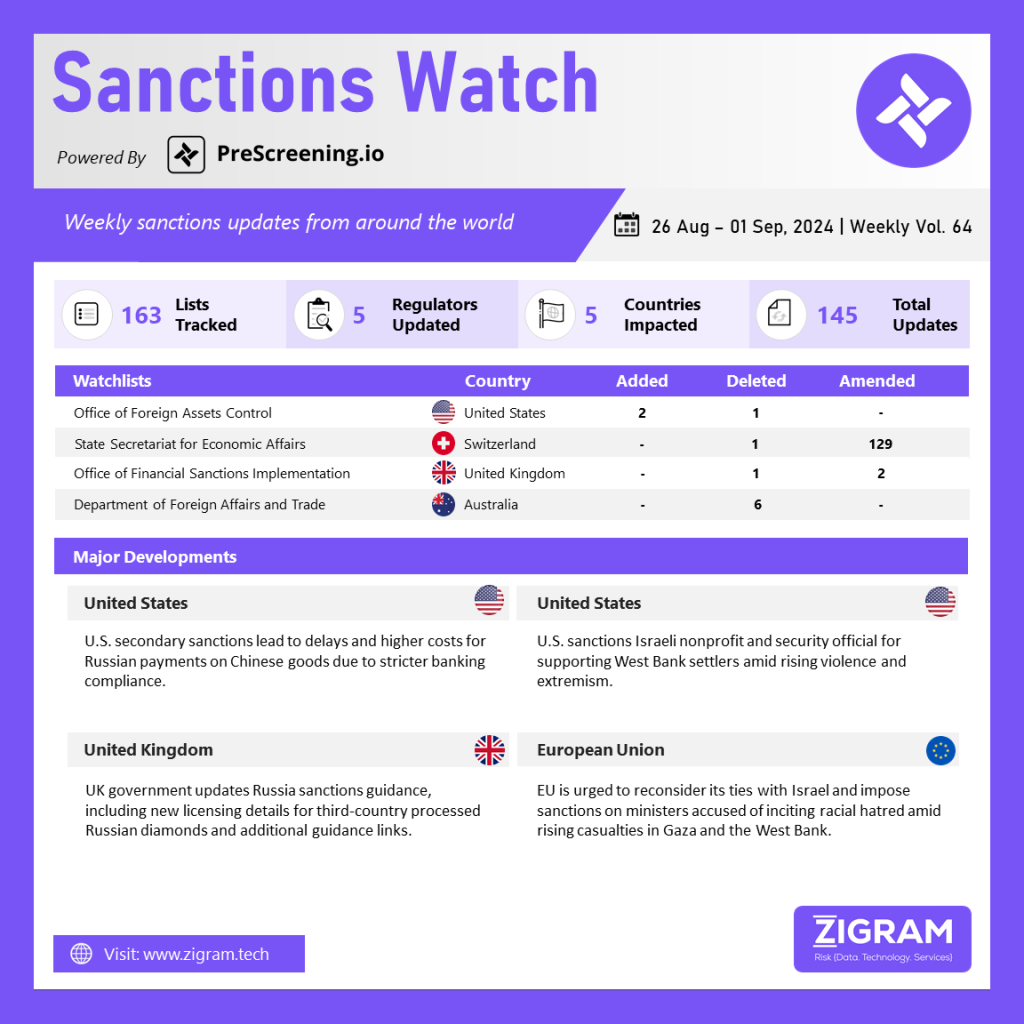Sanctions Watch Vol 64
In the latest edition of our Sanctions Watch weekly digest, we present significant updates on sanction watchlists and regulatory developments.
Delays And Rising Costs Hamper Russia-China Trade In August
Reuters reported that Russian payments for Chinese goods faced delays and rising costs due to stricter banking compliance, driven by U.S. threats of secondary sanctions. Chinese state banks halted transactions with Russian companies, leaving billions of yuan in limbo, impacting smaller businesses more than larger exporters. Despite these challenges, cross-border payments in priority areas remain smooth, supported by political will in both countries. Russian oil and grain exporters have not faced payment issues.
Trade between Russia and China grew by 1.6% to $137 billion in the first half of 2024, though Russia’s imports from China declined slightly by over 1%. The U.S. expanded secondary sanctions in June, allowing the Treasury Department to penalize foreign banks doing business with Russia. Consequently, Russian companies have resorted to using intermediaries in third countries, leading to a significant increase in transaction processing fees, rising to as much as 6%.
U.S. Sanctions Israeli Nonprofit That Supports West Bank Settlers In Latest Round Of Penalties
The U.S. has imposed sanctions on the Israeli nonprofit Hashomer Yosh and Yitzhak Levi Filant, a West Bank settlement security chief, amid rising violence in the West Bank. The State Department accuses Hashomer Yosh of aiding Israeli outposts and settlers under U.S. sanctions and obstructing the return of Palestinian residents from Khirbet Zanuta. Filant is sanctioned for leading armed settlers in attacks against Palestinians. This marks the latest U.S. effort to address extremist settler violence, following previous sanctions targeting settlers, outposts, and far-right organizations.
The U.S. aims to pressure Israel to hold its citizens accountable for violence. The Israeli government has protested the sanctions, viewing them as undue interference, while Hashomer Yosh argues that the sanctions unjustly target their support for Israeli agriculture. This development underscores a growing use of sanctions in U.S. foreign policy, with varying reactions from both Israeli and American groups.
Guidance On Third-country Processed Russian Diamond Measures
The UK has implemented sanctions under the Russia (Sanctions) (EU Exit) Regulations 2019, recently amended by the 2024 Regulations, to prohibit the import of Russian diamonds processed in third countries. This ban targets diamonds that have been altered outside Russia to obscure their origin, aiming to prevent circumvention of sanctions. From 1 March 2024, the ban applies to diamonds of 1 carat or more, extending to diamonds of 0.5 carats from 1 September 2024. Importers must provide documentation to prove compliance, including supply chain history and the origin of diamonds.
The UK government may grant individual or general trade licenses under specific conditions, and HMRC will enforce compliance. Non-compliance could result in criminal offenses. Importers are advised to ensure contracts affirm the non-Russian origin of diamonds and to stay updated on any regulatory changes.
EU Urged To Rethink Ties With Israel Over Gaza And Impose Sanctions Against Some Ministers
The European Union is reconsidering its relationship with Israel amid rising casualties in Gaza and the West Bank, with calls for sanctions against Israeli government ministers accused of inciting racial hatred. During a recent EU foreign ministers’ meeting in Brussels, Ireland’s foreign minister, Micheál Martin, criticized Israel’s military actions, accusing it of targeting civilians alongside Hamas militants and describing the situation as a war against Palestinians, not just Hamas. He emphasized that the EU’s response must align with the International Court of Justice’s ruling on the illegality of Israel’s occupation.
Despite internal divisions within the EU—Austria, Germany, and Hungary backing Israel, while Ireland and Spain advocate for the Palestinians—EU foreign policy chief Josep Borrell supports sanctions against certain Israeli ministers for inflammatory rhetoric. While a unanimous decision is required for sanctions, Borrell has initiated the process and plans a high-level U.N. meeting on the conflict.
Know more about the product: PreScreening.io
Click here to book a free demo.
Sanctions Watch is a weekly recap of events and news related to sanctions around the world.
- #UnitedStates
- #Compliance
- #China
- #CrossBorderPayments
- #RussianOil
- #Israel
- #Palestinian
- #ArmedSettlers
- #UnitedKingdom
- #RussianDiamonds
- #TradeBan
- #RegulatoryChanges
- #EuropeanUnion
- #HamasMilitants
- #SanctionsWatch
- #InternationalSanctions
- #EconomicSanctions
- #RegulatoryCompliance
- #TradeCompliance
- #SanctionsEnforcement
- #SanctionsViolations
- #FinancialCrime
- #Gaza
- #WestBank
